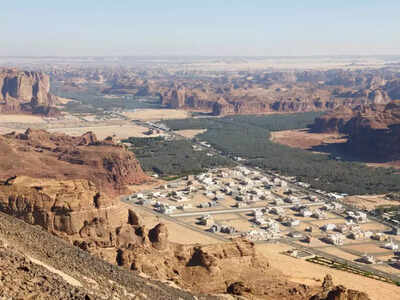- News
- World News
- Middle East News
- What ex-Colonel alleged about Neom project
Trending
What ex-Colonel alleged about Neom project
Col Rabih Alenezi, who has since sought asylum in the UK, disclosed to the BBC that he was directed to forcibly evacuate a village inhabited by members of the Huwaitat tribe to clear the way for The Line. This operation reportedly resulted in the fatal shooting of a villager who protested the eviction. The Saudi government and officials from Neom have not provided any comments regarding these allegations.

NEW DELHI: Saudi authorities have been authorized to employ lethal measures to facilitate the construction of a new, futuristic city, according to revelations from a former intelligence officer. The project, known as The Line, is a significant part of the $500 billion Neom eco-region initiative under Saudi Arabia's Vision 2030, which seeks to reduce the kingdom’s dependence on oil.
Col Rabih Alenezi, who has since sought asylum in the UK, disclosed to the BBC that he was directed to forcibly evacuate a village inhabited by members of the Huwaitat tribe to clear the way for The Line. This operation reportedly resulted in the fatal shooting of a villager who protested the eviction. The Saudi government and officials from Neom have not provided any comments regarding these allegations.
Neom represents the pinnacle of Crown Prince Mohammed bin Salman's ambitious plan to transform the economy of the world's leading oil exporter. The Line is envisioned as a revolutionary car-free city stretching over 170 kilometers but only 2.4 kilometers of it is expected to be completed by 2030. Despite being described by Crown Prince Mohamed bin Salman as the ideal "blank canvas," the project has led to the displacement of over 6,000 people, a number that some sources claim is an underestimate.
Analysis of satellite imagery by the BBC confirms the demolition of three villages, including homes, schools, and hospitals, which have been completely erased from the landscape. Alenezi’s account indicates that the clearance directive classified the residents as rebellious, authorizing lethal force against those who resisted eviction, the BBC report said.
This harsh approach to land clearance has led to the detention of 47 villagers, with several facing terror-related charges. Many of those detained were reportedly arrested for publicly grieving over al-Huwaiti’s death on social media platforms, the BBC report claimed.
While the Saudi authorities have purportedly offered compensation to those displaced by The Line, reports suggest that the payments have been significantly lower than promised. The implications of these operations on the local population and the environment raise serious ethical and human rights concerns.
Col Rabih Alenezi, who has since sought asylum in the UK, disclosed to the BBC that he was directed to forcibly evacuate a village inhabited by members of the Huwaitat tribe to clear the way for The Line. This operation reportedly resulted in the fatal shooting of a villager who protested the eviction. The Saudi government and officials from Neom have not provided any comments regarding these allegations.
Neom represents the pinnacle of Crown Prince Mohammed bin Salman's ambitious plan to transform the economy of the world's leading oil exporter. The Line is envisioned as a revolutionary car-free city stretching over 170 kilometers but only 2.4 kilometers of it is expected to be completed by 2030. Despite being described by Crown Prince Mohamed bin Salman as the ideal "blank canvas," the project has led to the displacement of over 6,000 people, a number that some sources claim is an underestimate.
Analysis of satellite imagery by the BBC confirms the demolition of three villages, including homes, schools, and hospitals, which have been completely erased from the landscape. Alenezi’s account indicates that the clearance directive classified the residents as rebellious, authorizing lethal force against those who resisted eviction, the BBC report said.
The incident of Abdul Rahim al-Huwaiti, who was killed by Saudi forces after refusing to let a land registry committee assess his property, was particularly highlighted. Despite claims from Saudi state security that al-Huwaiti was armed and had fired at officers, human rights organizations and the UN argue he was simply opposing eviction.
This harsh approach to land clearance has led to the detention of 47 villagers, with several facing terror-related charges. Many of those detained were reportedly arrested for publicly grieving over al-Huwaiti’s death on social media platforms, the BBC report claimed.
While the Saudi authorities have purportedly offered compensation to those displaced by The Line, reports suggest that the payments have been significantly lower than promised. The implications of these operations on the local population and the environment raise serious ethical and human rights concerns.
End of Article
FOLLOW US ON SOCIAL MEDIA











